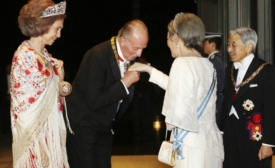dictatorship
Current news coverage duly notes Juan Carlos’ pivotal role in encouraging and preserving Spanish democracy in the years following the death of the geriatric dictator Francisco Franco in 1975. But the King is perceived in some quarters within and without Spain as tainted goods: a high-living hunter of Botswanan elephants in the midst of a national economic downturn, a less than uxorious royal spouse, saddled with a Marie Antoinette-esque daughter and larcenous son-in-law.

CPD Blogger Neal Rosendorf on the recent abdication of King Juan Carlos I, Spanish soft power, democracy and more.
One minute she's singing "Happy Birthday" to an African king, and the next she's being lambasted by human rights activists for endorsing the continent's "last absolute monarch" — the brutal and despotic Mswati III of Swaziland.
North Korean state television has released cherubic photographs of dictator Kim Jong-un as a child after the photos were shown during a special Air Force concert held in his honor.
This month, Brazil marks a particularly grim moment in its history. Fifty years ago, the country’s military took power in a coup that ushered in two decades of brutal dictatorship. President Dilma Rousseff, who as a young leftist guerrilla fighting the generals was jailed and tortured, marked the occasion with a speech at Rio de Janeiro’s Galeão airport earlier this month.
Thirty years ago, after the fall of Argentina’s military dictatorship following defeat in the Malvinas/Falklands war with Britain, a newly elected President Raúl Alfonsín created the Human Rights Commission known as Conadep (Comisión Nacional sobre la Desaparición de Personas, or National Commission on the Disappearance of Persons). The first of its kind, Conadep’s main purpose was to investigate the crimes committed by the preceding military dictatorship and bring its perpetrators to justice.
The four ex heads of state and other politicians received the Ulyses Guimarares medal the highest decoration of the Brazilian Congress for their contributions to the current constitution. The constitution, the seventh in the country's history, was promulgated on 5 October 1988, after a year and eight months of discussions by a constituent assembly elected in 1986.







